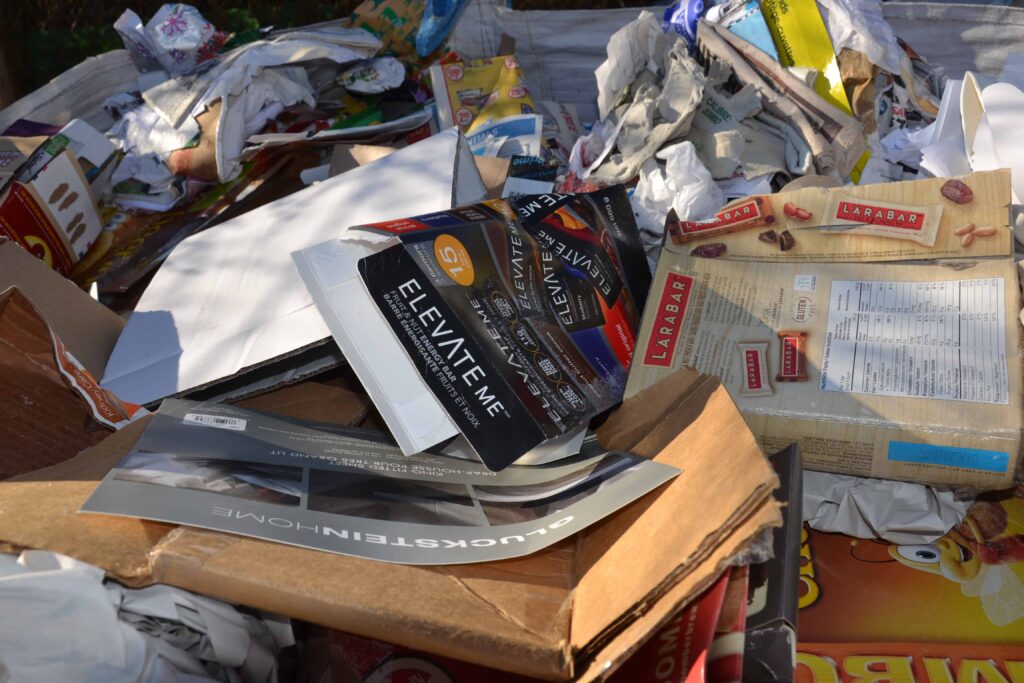Paper makes up approximately 66% of the material collected in Recycle BC’s residential packaging and paper recycling program. There are different types of paper included for recycling and it’s very important that only accepted materials are placed in your recycling to ensure it can be recycled and not rejected due to contamination. Below are the Do’s and Don’ts of paper recycling.
Do:
1. Recycle paper – It’s easy, you have a way to recycle paper, so let’s do it! Here’s a little more information about what types of paper can be included in your recycling:
Types of accepted paper:
- Printed paper – newspapers, inserts, flyers; magazines and catalogues; telephone directories; writing and home office paper, paper envelopes, and notepads; paper gift wrap and greeting cards; shredded paper (contain in paper bag or box)
- Paper packaging – boxboard boxes used for cereal, tissues, frozen entrees, desserts, detergent, etc.; cores for paper towels and toilet tissue; moulded boxboard packaging for egg cartons, take-out beverage trays, paper-based plant pots; paper bags (also called kraft paper) and envelopes; paper bags for flour, sugar, etc.
- Cardboard boxes – corrugated boxes used for shipping, grocery and liquor store boxes; pizza boxes; carrier trays used for bottled water, soft drinks, cans, etc.; shoeboxes.
2. Put ONLY paper in your paper recycling if recycling at a depot or in a multi-stream curbside or multi-family recycling program where paper is separated from containers – It’s important that your paper recycling only contains paper materials and that metal and plastic containers are placed separately in a different bin. Often recyclable paper comes with or in other materials that shouldn’t be included with paper recycling like rubber bands or plastic sleeves that often accompany newspapers and magazines. Please ensure to remove these materials before placing paper in your recycling bin. (plastic bags can be returned to a Recycle BC depot for recycling)
Don’t:
1. Let problem materials sneak into your recycling. One of the most common problem materials is plastic bags. In addition to jamming machinery, plastic bags and other types of film packaging (only accepted at depots) can significantly impact this sorting process when mixed with other recycling in your recycling bin at home or at a depot. Given their size, weight and general characteristics, plastic bags are often sorted into the paper/cardboard stream by the processing equipment if incorrectly commingled in the recycling.
Other materials that should be excluded from your recycling that can often contaminate the paper stream include plastic shipping envelopes, bubble envelopes, foil and non-paper gift wrap, and ribbons and bows, paper bags with foil linings, wax paper and parchment paper.
Why it’s important
Entire shipments of paper/cardboard may be rejected by the company recycling the material if contamination rates (when materials that aren’t paper are included) are too high. Even 1% of non-paper in a bale of paper makes it subject to rejection and 3% is considered very high. High levels of material contamination not only risks rejection by the recycler, it can also negatively impact equipment and safety at receiving facilities. We want to ensure that all paper is recycled into new materials, and having paper that contains other materials could pose a significant risk to the viability of existing recycling markets.
Let’s make a difference together! Ensure your paper recycling only contains paper, so it can be made into new products like new paper products, drywall liner, kraft paper, paper towel and tissues.




